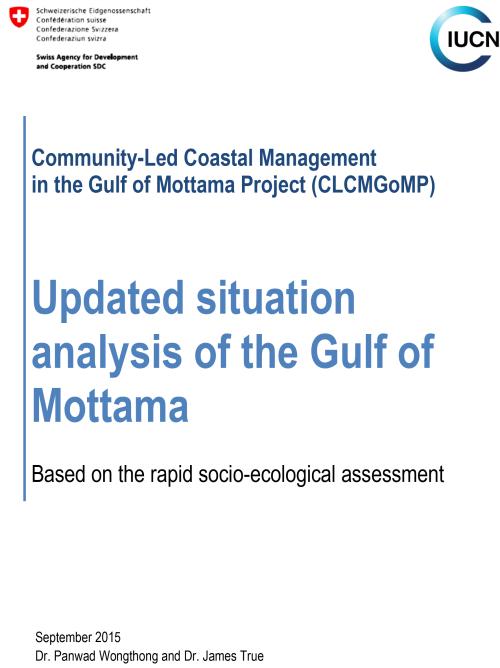Receiving large masses of sediments from Ayeyarwady, Sittaung and Thanlwin Rivers, the Gulf of Mottama (GoM) is recognized as the most extensive and most significant intertidal mudflat system in Southeast Asia. It provides ecosystem goods and services to communities living in Mon State, Bago Region and Yangon Region, and supports a variety of aquatic species and wintering shorebirds. Due to difficult access to the area, the Gulf of Mottama (or the Gulf of Martaban) is one of the least studied coasts in the country. Given its significance as wintering ground for the Critically Endangered Spoon-billed sandpiper, the gulf has recently attracted attention from researchers, development partners as well as bird watchers from across the region.
This scoping study is part of inception period of the 10-year Community-Led Coastal Management in the Gulf of Mottama Project (GoMP) supported by the Swiss Agency for Development and Cooperation (SDC). The project is being implemented by a consortium led by HELVETAS with NAG (National Action Group, local NGO) and IUCN. A rapid socio-ecological assessment was conducted by IUCN research team between 6-10 June 2015, with an aim to understand the current fisheries and ecosystem resources as well as socio-economic situation, in order to provide scientific evidence for sustainable and equitable management of special habitats of the GoM. The rapid survey covered six coastal villages in Mon State, Bago Region and Yangon Region. This document provides an overall picture of the gulf, including its biophysical characteristics, socio-economic conditions of coastal population, fishing activities, status of fishery resources, and issues facing sustainable management of fisheries in the gulf, based on latest information from various sources, field assessment and interviews with key stakeholders. It is recommended in this report that various approaches and urgent actions are required to improve local livelihoods, coastal community resilience, and to support the establishment of a collaborative long-term fisheries and coastal ecology in the gulf. The synthesis data from this study will contribute to long-term fisheries assessment and ecological monitoring in the gulf, and also provide the basis for state/region governments in drafting resource management guidelines, and as reference to the Ramsar initiative committee for process of designating the gulf as a wetland of international importance.
Published By:
Published Date:
